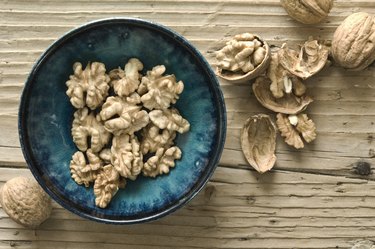
Walnuts deserve a spot near the top of the list of Foods You Should Eat More Often. So if they're giving you a stomach ache, you might be wondering what the problem is.
The rich, crunchy tree nuts are loaded with fiber, omega-3 fatty acids and even brain-boosting antioxidants. And while they're not necessarily known for causing stomach aches, there are cases where walnuts might do your belly bad.
Video of the Day
Video of the Day
Here are five possible reasons why eating walnuts might lead to GI issues and what you can do to feel better. Plus, find out whether the tannins or phytates in walnuts can really hurt your stomach.
Tip
If you're have a walnut allergy or intolerance, they can cause stomach pain, gas and bloating. You may also experience nausea or diarrhea. Overeating can also lead to some of these side effects. Depending on what's leading to walnuts causing GI distress, you may not have to miss out on their nutritional benefits.
1. You Ate Too Many
Overdoing it on any food can give you a bellyache. But foods that are high in fiber and fat — including walnuts — can make you particularly uncomfortable when you scarf down a lot at once, especially if you're not used to eating a lot of roughage.
"You can get abdominal cramping, bloating or gas because of the fiber or fat content," says Supriya Rao, MD, a board-certified gastroenterologist with Integrated Gastroenterology Consultants in Chelmsford, Massachusetts.
As a general best practice to relieve stomach pain after eating nuts, drink water along with the nuts. And take it slow when it comes to adding fiber to your diet.
2. They're Messing With Your Irritable Bowel Syndrome
Nuts like walnuts don't bother everyone with irritable bowel syndrome (IBS). But if you eat a lot of walnuts and get crampy or bloated from the fiber content, you might be more likely to notice those symptoms if you have IBS.
"In people with IBS, the nerve endings in the gut are hypersensitive," Dr. Rao says. "So if you're going to have bloating from walnuts, that may make someone with IBS feel worse."
3. You Have a Tree Nut Allergy
Tree nuts including walnuts are a common allergen. And while most people think of reactions to food allergens in terms of hives or trouble breathing, it's also common to experience abdominal symptoms like cramping, nausea, vomiting or diarrhea, according to the American College of Allergy, Asthma, & Immunology (ACAAI).
If you experience allergic reaction-like symptoms after eating walnuts, consult an allergist. They can conduct a simple test to confirm your allergy.
Warning
Peanuts and tree nuts are among the most common causes of anaphylaxis, a rare but life-threatening allergic reaction. Call 911 immediately if you or someone else experiences symptoms such as shortness of breath, throat tightness, swelling, dizziness or loss of consciousness from consuming walnuts.
4. You Have a Food Intolerance
Food intolerances happen when the body has trouble digesting a certain food. Unlike food allergies, food intolerances don't have the potential to trigger life-threatening symptoms like swelling or trouble breathing. But they can make you uncomfortable and cause digestive problems like cramping, nausea, diarrhea, gas or heartburn as well as headaches.
Walnuts aren't a common cause of food intolerance, per the Cleveland Clinic. But if they just don't seem to agree with you — and you and your doctor have ruled out other causes — an intolerance could be the culprit.
5. You Have Diverticulitis
Diverticulitis happens when diverticula — small, bulging pouches that can form in the digestive tract with age — become temporarily inflamed or infected.
Eating walnuts or other nuts or seeds doesn't cause diverticula to form, and if you have them, it's fine to eat these foods, Dr. Rao says. But if they happen to become infected and cause symptoms like fever or nausea, you'll want to steer clear until you feel better. "When you have an active infection, you should stick to a liquid diet until it passes," Dr. Rao says.
What About Anti-Nutrients?
You might've heard that walnuts contain anti-nutrients like tannins and phytates. These naturally-occurring compounds exist in many plant foods as a form of protection from insects and bacteria, and in some cases, can decrease the absorption of some nutrients.
But they probably can't mess with your stomach, experts say.
Despite warnings you might've seen online, anti-nutrients aren't toxic to humans and they haven't been shown to cause stomach problems, according to an October 2020 review published in the journal Nutrients.
Bottom line: "There's not great evidence behind those claims," Dr. Rao says.
What to Do When Walnuts Cause Stomach Pain
If you want to eat more walnuts but your belly doesn't agree, these tips can help ward off symptoms:
- Pay attention to your portion. A serving size of walnuts is one ounce, or about a handful. Try cutting back if you're grabbing more. Having a more moderate helping might solve the problem.
- Pair water with walnuts. Drinking a glass of water with high-fiber foods like walnuts can help the fiber move through your GI tract more efficiently. That can help reduce symptoms like bloating and gas, Dr. Rao says.
- Pay attention to your overall fiber intake. There's no established upper limit for fiber, but most people start to notice GI discomfort once their intake hits 40 to 70 grams per day. A one-ounce serving of walnuts contains 2 grams of fiber, so consider how that amount fits into your diet and find ways to lower your intake if it seems like you're overdoing it.
- Talk with your doctor. Let your primary care provider know if walnuts give you a stomach ache more than once or twice, Dr. Rao recommends. Together you can discuss your symptoms and decide if you should see a gastroenterologist or an allergist.
Was this article helpful?
150 Characters Max
0/150
Thank you for sharing!
Thank you for your feedback!
Is this an emergency? If you are experiencing serious medical symptoms, please see the National Library of Medicine’s list of signs you need emergency medical attention or call 911.


